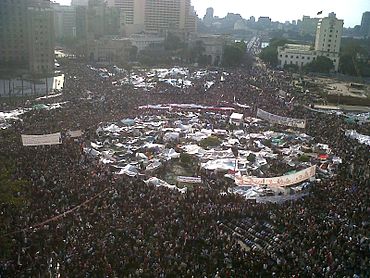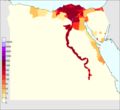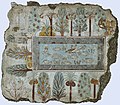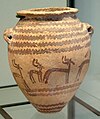Egypt Arabic : مصر Miṣr [mesˁr] Egyptian Arabic pronunciation: [mɑsˤr] Arab Republic of Egypt , is a transcontinental country spanning the northeast corner of Africa and the Sinai Peninsula in the southwest corner of Asia . It is bordered by the Mediterranean Sea to the north , the Gaza Strip of Palestine and Israel to the northeast , the Red Sea to the east, Sudan to the south , and Libya to the west . The Gulf of Aqaba in the northeast separates Egypt from Jordan and Saudi Arabia . Cairo is the capital and largest city of Egypt , while Alexandria , the second-largest city, is an important industrial and tourist hub at the Mediterranean coast . At approximately 100 million inhabitants, Egypt is the 14th-most populated country in the world , and the third-most populated in Africa.
Egypt has one of the longest histories of any country, tracing its heritage along the Nile Delta back to the 6th–4th millennia BCE. Considered a cradle of civilisation , Ancient Egypt saw some of the earliest developments of writing, agriculture, urbanisation, organised religion and central government. Egypt was an early and important centre of Christianity , but largely adopted Islam in the seventh century. Cairo became the capital of the Fatimid Caliphate in the tenth century, and of the Mamluk Sultanate in the 13th century. Egypt then became part of the Ottoman Empire in 1517, before its local ruler Muhammad Ali established it as an autonomous Khedivate in 1867. The country was then occupied by the British Empire and gained independence in 1922 as a monarchy . Following the 1952 revolution , Egypt declared itself a republic , and in 1958 it merged with Syria to form the United Arab Republic , which was dissolved in 1961. Egypt fought several armed conflicts with Israel in 1948 , 1956 , 1967 and 1973 , and occupyed the Gaza Strip intermittently until 1967. In 1978, Egypt signed the Camp David Accords , which recognised Israel in exchange for its withdrawal from the Sinai. After the Arab Spring , which led to the 2011 Egyptian revolution and overthrow of Hosni Mubarak , the country faced a protracted period of political unrest ; this included the election in 2012 of a brief, short-lived Muslim Brotherhood -aligned Islamist government spearheaded by Mohamed Morsi , and its subsequent overthrow after mass protests in 2013 .
Egypt is considered to be a regional power in North Africa , the Middle East and the Muslim world , and a middle power worldwide. It is a developing country having a diversified economy, which is the largest in Africa , the 38th-largest economy by nominal GDP and 127th by nominal GDP per capita. Egypt is a founding member of the United Nations , the Non-Aligned Movement , the Arab League , the African Union , Organisation of Islamic Cooperation , World Youth Forum , and a member of BRICS . (Full article...
The 2011 Egyptian revolution 25 January Revolution (Arabic : ثورة ٢٥ يناير ; Thawrat khamsa wa-ʿišrūn yanāyir Egypt . The date was set by various youth groups to coincide with the annual Egyptian "Police holiday" as a statement against increasing police brutality during the last few years of Hosni Mubarak 's presidency. It consisted of demonstrations, marches, occupations of plazas, non-violent civil resistance , acts of civil disobedience and strikes . Millions of protesters from a range of socio-economic and religious backgrounds demanded the overthrow of Egyptian President Hosni Mubarak . Violent clashes between security forces and protesters resulted in at least 846 people killed and over 6,000 injured. Protesters retaliated by burning over 90 police stations across the country.
The Egyptian protesters' grievances focused on legal and political issues, including
police brutality , state-of-emergency laws, lack of
political freedom , civil liberty,
freedom of speech , corruption, high unemployment, food-price
inflation and low wages. The protesters' primary demands were the end of the
Mubarak regime. Strikes by
labour unions added to the pressure on government officials. During the uprising, the capital,
Cairo , was described as "a war zone" and the port city of
Suez saw frequent violent clashes. Protesters defied a government-imposed
curfew , which the police and military could not enforce in any case. Egypt's
Central Security Forces , loyal to Mubarak, were gradually replaced by military troops. In the chaos, there was
looting by rioters which was instigated (according to opposition sources) by plainclothes police officers. In response, watch groups were organised by civilian
vigilantes to protect their neighborhoods. (
Full article... )
List of selected articles
The following are images from various Egypt-related articles on Wikipedia.
Image 1 Anubis , the god associated with mummification and burial rituals, attending to a mummy. (from
Ancient Egypt )
Image 3 British infantry near
El Alamein , 17 July 1942 (from
Egypt )
Image 4 Four colossal statues of
Ramesses II flank the entrance of his temple
Abu Simbel (from
Ancient Egypt )
Image 5 Lower-class occupations (from
Ancient Egypt )
Image 7 The
Qattara Depression in Egypt's north west (from
Egypt )
Image 8 The well preserved Temple of Isis from
Philae is an example of
Egyptian architecture and
architectural sculpture (from
Ancient Egypt )
Image 9 President el-Sisi with US President
Joe Biden , 11 November 2022 (from
Egypt )
Image 11 Pharaohs' tombs were provided with vast quantities of wealth, such as the
golden mask from the mummy of Tutankhamun . (from
Ancient Egypt )
Image 12 The "weighing of the heart" scene from the
Book of the Dead (from
Egypt )
Image 13 The halls of Karnak Temple are built with rows of large columns. (from
Ancient Egypt )
Image 14 Smart Village , a business district established in 2001 to facilitate the growth of high-tech businesses (from
Egypt )
Image 16 The
Giza Necropolis is the oldest of the
ancient Wonders and the only one still in existence. (from
Egypt )
Image 17 Muhammad Ali was the founder of the
Muhammad Ali dynasty and the first
Khedive of Egypt and
Sudan . (from
Egypt )
Image 18 Prominent Egyptian dissident
Alaa Abd El-Fattah was sentenced to five years of imprisonment in December 2021. (from
Egypt )
Image 19 The
Al-Hakim Mosque in Cairo, of
Al-Hakim bi-Amr Allah , the sixth caliph, as renovated by
Dawoodi Bohra (from
Egypt )
Image 20 Egypt under Muhammad Ali dynasty (from
Egypt )
Image 21 Frontispiece of
Description de l'Égypte , published in 38 volumes between 1809 and 1829. (from
Ancient Egypt )
Image 22 Egypt's population density (people per km
2 ) (from
Egypt )
Image 23 The Cairo Metro (line 2) (from
Egypt )
Image 24 Salah Zulfikar , film star (from
Egypt )
Image 25 The
Eastern Imperial Eagle is the national animal of Egypt. (from
Egypt )
Image 26 Egyptian
tomb models as funerary goods. (from
Ancient Egypt )
Image 27 The
Amr ibn al-As mosque in Cairo, recognised as the oldest in Africa (from
Egypt )
Image 28 Temple of Derr ruins in 1960 (from
Egypt )
Image 29 Egyptian President
Gamal Abdel Nasser in Mansoura, 1960 (from
Egypt )
Image 30 Egypt's topography (from
Egypt )
Image 31 Wooden figures of soldiers, from the tomb of nomarch
Mesehti (
11th dynasty ) (from
Ancient Egypt )
Image 32 Hunting game birds and plowing a field, tomb of
Nefermaat and his wife
Itet (
c. 2700 BC ) (from
Ancient Egypt )
Image 33 Egyptian literacy rate among the population aged 15 years and older by UNESCO Institute of Statistics (from
Egypt )
Image 34 Naguib Mahfouz , the first Arabic-language writer to win the
Nobel Prize in Literature (from
Egypt )
Image 35 Early tomb painting from
Nekhen ,
c. 3500 BC , Naqada, possibly Gerzeh, culture (from
Ancient Egypt )
Image 36 Egypt is the eighth most water stressed country in the world. (from
Egypt )
Image 37 Hatshepsut's trading expedition to the
Land of Punt (from
Ancient Egypt )
Image 38 Green irrigated land along the Nile amidst the desert and in the delta (from
Egypt )
Image 39 An offshore platform in the Darfeel Gas Field (from
Egypt )
Image 41 Arabic calligraphy has seen its golden age in
Cairo . This adornment and beads being sold in
Muizz Street (from
Culture of Egypt )
Image 42 The
Suez Canal (from
Egypt )
Image 43 The
Fayum mummy portraits epitomize the meeting of Egyptian and Roman cultures. (from
Ancient Egypt )
Image 44 The
pyramids of Giza are among the most recognizable symbols of ancient Egyptian civilization. (from
Ancient Egypt )
Image 48 The
Narmer Palette depicts the unification of the Two Lands. (from
Ancient Egypt )
Image 49 Tourists riding an
Arabian camel in front of
Pyramid of Khafre . The
Giza Necropolis is one of Egypt's main tourist attractions. (from
Egypt )
Image 50 Measuring and recording the harvest, from the tomb of
Menna at
Thebes (Eighteenth Dynasty). (from
Ancient Egypt )
Image 51 Protesters from the Third Square movement, which supported neither the former Morsi government nor the Armed Forces, 31 July 2013 (from
Egypt )
Image 52 The pharaoh was usually depicted wearing symbols of royalty and power. (from
Ancient Egypt )
Image 53 Ruins of Deir el-Medina (from
Ancient Egypt )
Image 54 Smoke rises from oil tanks beside the
Suez Canal hit during the initial
Anglo-French assault on Egypt, 5 November 1956. (from
Egypt )
Image 56 Kushari , one of Egypt's national dishes (from
Egypt )
Image 57 Soad Hosny , film star (from
Egypt )
Image 58 Egyptians celebrated feasts and festivals, accompanied by music and dance. (from
Ancient Egypt )
Image 59 Hieroglyphs on stela in
Louvre , c. 1321 BC (from
Ancient Egypt )
Image 60 Painted limestone relief of a noble member of Ancient Egyptian society during the New Kingdom (from
Ancient Egypt )
Image 61 Al-Azhar Park is listed as one of the world's sixty great public spaces by the
Project for Public Spaces . (from
Egypt )
Image 63 Sennedjem plows his fields in
Aaru with a pair of oxen,
Deir el-Medina (from
Ancient Egypt )
Image 64 The
Egyptian Museum of Cairo (from
Egypt )
Image 65 Egyptian honour guard soldiers during a visit of U.S. Navy Adm. Mike Mullen (from
Egypt )
Image 66 Napoleon defeated the
Mamluk troops in the
Battle of the Pyramids , 21 July 1798, painted by
Lejeune . (from
Egypt )
Image 67 The preserved Temple of Horus at Edfu is a model of Egyptian architecture. (from
Ancient Egypt )
Image 68 The
Edwin Smith surgical papyrus describes anatomy and medical treatments, written in
hieratic ,
c. 1550 BC (from
Ancient Egypt )
Image 69 Rectangular fishpond with ducks and
lotus planted round with date palms and fruit trees,
Tomb of Nebamun , Thebes, 18th Dynasty (from
Ancient Egypt )
Image 70 Hosni Mubarak was the president of Egypt from 1981 until his overthrew in 2011 (from
Egypt )
Image 71 Cairo grew into a
metropolitan area with a population of over 20 million. (from
Egypt )
Image 72 The
Temple of Dendur , completed by 10 BC,
Metropolitan Museum of Art (New York City) (from
Ancient Egypt )
Image 74 The High Court of Justice in
Downtown Cairo (from
Egypt )
Image 76 Seagoing ship of an expedition to Punt, from a relief of
Hatshepsut's Mortuary temple , Deir el-Bahari (from
Ancient Egypt )
Image 77 The Ptolemaic Queen
Cleopatra VII and her son by Julius Caesar,
Caesarion , at the
Temple of Dendera (from
Egypt )
Image 78 Female nationalists demonstrating in
Cairo , 1919 (from
Egypt )
Image 79 Egyptian tanks advancing in the Sinai desert during the
Yom Kippur War , 1973 (from
Egypt )
Image 80 A tomb relief depicts workers plowing the fields, harvesting the crops, and threshing the grain under the direction of an overseer, painting in the tomb of
Nakht (from
Ancient Egypt )
Image 81 Statues of two pharaohs of Egypt's
Twenty-Fifth Dynasty and several other
Kushite kings,
Kerma Museum . (from
Ancient Egypt )
Image 83 Tutankhamun's burial mask is one of the major attractions of the
Egyptian Museum of Cairo. (from
Egypt )
Image 84 Coffin of Khnumnakht in 12th dynasty style, with palace facade, columns of inscriptions, and two Wedjat eyes (from
Ancient Egypt )
Image 85 Khafre enthroned (from
Ancient Egypt )
Image 86 The Weighing of the Heart from the
Book of the Dead of Ani (from
Egypt )
Image 87 Women in Cairo wear face masks during the
COVID-19 pandemic in Egypt in March 2020. (from
Egypt )
Image 88 Glassmaking was a highly developed art. (from
Ancient Egypt )
Image 90 Tanoura dancers performing in Wekalet El Ghoury, Cairo (from
Egypt )
Image 92 Illustration of various types of capitals, by
Karl Richard Lepsius (from
Ancient Egypt )
Image 93 Tutankhamun charging enemies on his
chariot , 18th dynasty. (from
Ancient Egypt )
Image 94 A crowd at Cairo Stadium watching the
Egypt national football team (from
Egypt )
Image 95 Menna and Family Hunting in the Marshes, Tomb of Menna,
c. 1400 BC (from
Ancient Egypt )
Image 97 Model of a household porch and garden,
c. 1981–1975 BC (from
Ancient Egypt )
Image 98 The
Book of the Dead was a guide to the deceased's journey in the afterlife. (from
Ancient Egypt )
Image 99 Change in per capita GDP of Egypt, 1820–2018. Figures are inflation-adjusted to 2011 International dollars. (from
Egypt )
Image 100 A figure wearing the red crown of Lower Egypt, most probably
Amenemhat II or
Senwosret II . It functioned as a divine guardian for the
imiut ; the divine kilt, suggests that the statuette was not merely a representation of the living ruler. (from
Ancient Egypt )
Image 101 Ancient Egyptians playing music (from
Egypt )
Image 102 The gods
Osiris ,
Anubis , and
Horus in the tomb of Horemheb (
KV57 ) in the Valley of the Kings. (from
Ancient Egypt )
Image 103 A typical
Naqada II jar decorated with gazelles (Predynastic Period) (from
Ancient Egypt )
Laban rayeb is a type of curdled skim and
fermented milk made in Lower Egypt. It may be drunk fresh or may be used to make
areesh cheese, which in turn is used to make
mish . There is evidence that it was made by the ancient Egyptians. (
Full article... )
Religions in Egypt
Arab states
Other countries
NC - Non-consecutive terms; Bold - Current
Beverages
Non-alcoholic beverages Alcoholic beverages
Breads Appetizers Cheeses Soups Dishes Grilled meats Desserts Common ingredients
Related cuisines
Official language Spoken Arabic dialects Historical languages Minority languages Foreign languages Immigrant minority languages Sign languages
Public institutions National institutions Private institutions
Category puzzle Select [►] to view subcategories
This list was generated from
these rules . Questions and feedback
are always welcome ! The search is being run daily with the most recent ~14 days of results.
Note: Some articles may not be relevant to this project.
Rules | Match log | Results page (for watching) | Last updated: 2024-04-26 20:27 (UTC)
Note : The list display can now be customized by each user. See List display personalization for details.
Siege of Akka (1832) (edit | talk | history | links | watch | logs | tools )Kolya Muratov (talk · contribs · new pages (4) Fatma Aly (edit | talk | history | links | watch | logs | tools )Kalakpagh (talk · contribs · new pages (8) Yemeni civil war (1994) (edit | talk | history | links | watch | logs | tools )Robertsky (talk · contribs · new pages (219) Abydos King List (Ramesses II) (edit | talk | history | links | watch | logs | tools )A. Parrot (talk · contribs · new pages (1) Enrique Meneses (edit | talk | history | links | watch | logs | tools )NoahRiffe (talk · contribs · new pages (1) The Corning Ewer (edit | talk | history | links | watch | logs | tools )TiaIvy (talk · contribs · new pages (1) Derrick Main (edit | talk | history | links | watch | logs | tools )Jevansen (talk · contribs · new pages (838) Fasel Men El Lahazat El Lazeeza (edit | talk | history | links | watch | logs | tools )Midwood123 (talk · contribs · new pages (1) Isis (journal, 1816) (edit | talk | history | links | watch | logs | tools )Martin Libenson (talk · contribs · new pages (5) History of Urfa (edit | talk | history | links | watch | logs | tools )Aintabli (talk · contribs · new pages (12) Battle of Hims (1832) (edit | talk | history | links | watch | logs | tools )Kolya Muratov (talk · contribs · new pages (4) 2009 African Rhythmic Gymnastics Championships (edit | talk | history | links | watch | logs | tools )Maniakilljoy97 (talk · contribs · new pages (14)

































































































































